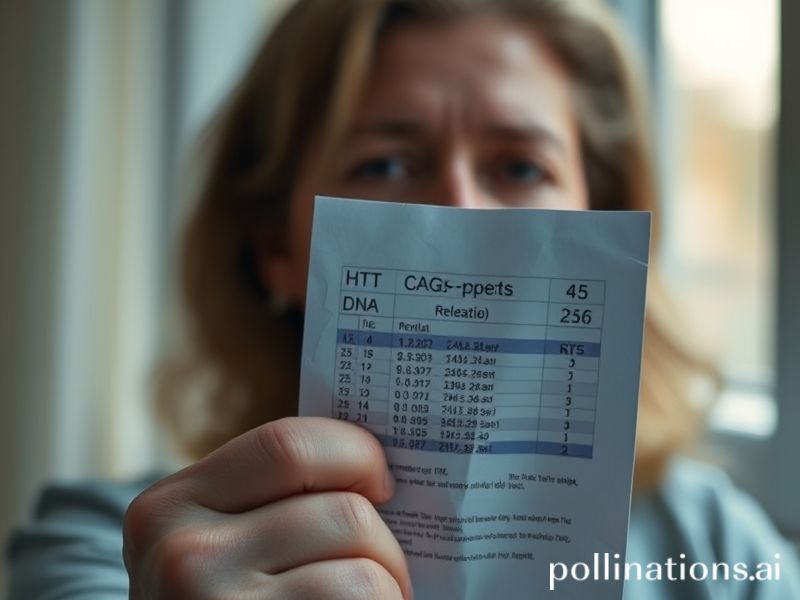The Borderless Genetic Saboteur: How Huntington’s Disease Outruns Passports and Profiteers Alike
**The Genetic Time Bomb That Doesn’t Need a Passport**
*How Huntington’s disease quietly reminds the world that biology is the ultimate xenophobe*
If you drew a map of Huntington’s disease prevalence and held it up to the light, you’d notice something grimly democratic: the blotches of color land on Caracas as comfortably as they do on Copenhagen. Roughly one in every 10,000 humans—about the same odds as being trampled by a cow, only slower—carries the dominant genetic typo that turns middle age into a neurological demolition derby. No border wall, trade embargo, or airport body scanner has ever stopped it, which may explain why governments only fund research when their own finance ministers start dropping pens.
Take Venezuela’s Lake Maracaibo region, where the mutation has been having a family reunion since the 1800s. Local fishermen once blamed the “evil wind” sweeping across the water; today their descendants blame the slightly more scientific “expanded CAG repeat,” a stutter in the DNA that lengthens every time a carrier passes it along. The result is a pedigree so detailed geneticists use it as the gold standard, and a local economy so dependent on foreign research grants that when grant cycles dip, souvenir stalls start selling T-shirts reading “My vacation supported your PhD.”
Europe, never one to be outdone on existential dread, contributes its own bureaucratic flourish. In 1993 the Netherlands politely informed insurance companies that discriminating on the basis of a predictive Huntington’s test was illegal—then watched premiums creep up anyway, like teenagers sneaking home after curfew. Meanwhile the U.K.’s National Health Service will pay for your genetic test, but if you want the experimental antisense oligonucleotide that might (emphasis on might) slow progression, you’re welcome to remortgage your flat. The drug costs about £300,000 annually, or roughly one London parking space per year—choose your neurodegeneration, capitalist edition.
Asia, long congratulating itself on “lower prevalence,” is discovering the joys of late diagnosis. Japanese neurologists report that families often attribute early symptoms to work stress, sake, or the vague catch-all “overwork death,” proving that cultural stereotypes can be weaponized for denial just as effectively as any MRI. China’s first dedicated Huntington’s clinic opened in 2019; officials hailed it as proof of rising healthcare standards, neglecting to mention that patients still need to travel 1,000 kilometers and bribe three receptionists for the privilege of hearing there’s no cure.
The global pharmaceutical playbook remains charmingly consistent: announce breakthrough in press release, watch stock jump 12 %, release follow-up study noting “modest efficacy,” watch stock drop 15 %. Roche’s tominersen, the latest contestant on “Who Wants to Be an Orphan Drug,” was paused in 2021 after patients on the high dose declined faster than those on placebo—an outcome scientists dryly labeled “unexpected,” which is academic speak for “we just spent $50 million to prove we can accelerate brain rot.”
Still, every cloud has its silver-plated lining. The European Union recently added Huntington’s to its list of “priority diseases,” a designation that unlocks accelerated review and, more importantly, allows regulators to vacation at conferences in Cyprus under the guise of stakeholder engagement. The WHO, not to be outdone, published a global roadmap that recommends “raising awareness,” a strategy previously deployed against climate change, obesity, and the inexplicable popularity of reality television.
In the end, Huntington’s remains the perfect metaphor for 21st-century citizenship: hereditary, expensive, and indifferent to your LinkedIn profile. It teaches that the genome is the last truly open border, that biotech investors have shorter attention spans than TikTok teens, and that every nation’s healthcare system is equally creative when billing the dying. The disease will march on, generation after generation, while we argue over copays and patent extensions—proof that when it comes to shared human misery, globalization is already a smashing success.







